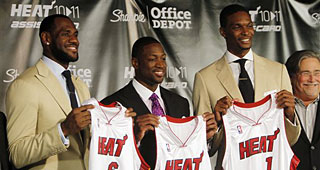Last October, David Stern spoke openly about the benefit the NBA was about to receive from the formation of a Miami Heat team featuring LeBron James, Dwyane Wade and Chris Bosh.
"My guess," he said during a preseason media session, "is that the Heat is not going to play to too many empty seats on the road, as people want to see this team. We have had other sort of super teams -- they're called the Celtics, Lakers, Spurs. In different ages, we've had Hall of Famers that come together and teams have gathered them.
"I think that team has generated spectacular interest, and all in all it's been very good for the NBA."
During the 2011 NBA Finals, however, Stern was asked if Miami's Big 3 will be able to stay together under a new collective bargaining agreement.
"We've tried to make it more attractive for players to stay with their current team. That trend will continue if not be enhanced."
Now, the NBA is pushing for a harder salary cap, which will force teams to relinquish some of their core players.
"That's what caps do," Stern said, "they move players around and distribute players a little more equally."
Stern admitted during a recent interview that the reduction of Bird Rights, the increase of the luxury tax, the hardening of the cap can only do so much to sway player preference.
"There are natural advantages to certain cities," he said. "Some people like lakes, and you can go to cities with lakes. Some people like the ocean and you can go to South Beach. But there is an increasing sense that 'glamorous' cities have an edge and I guess it's always been that way."


